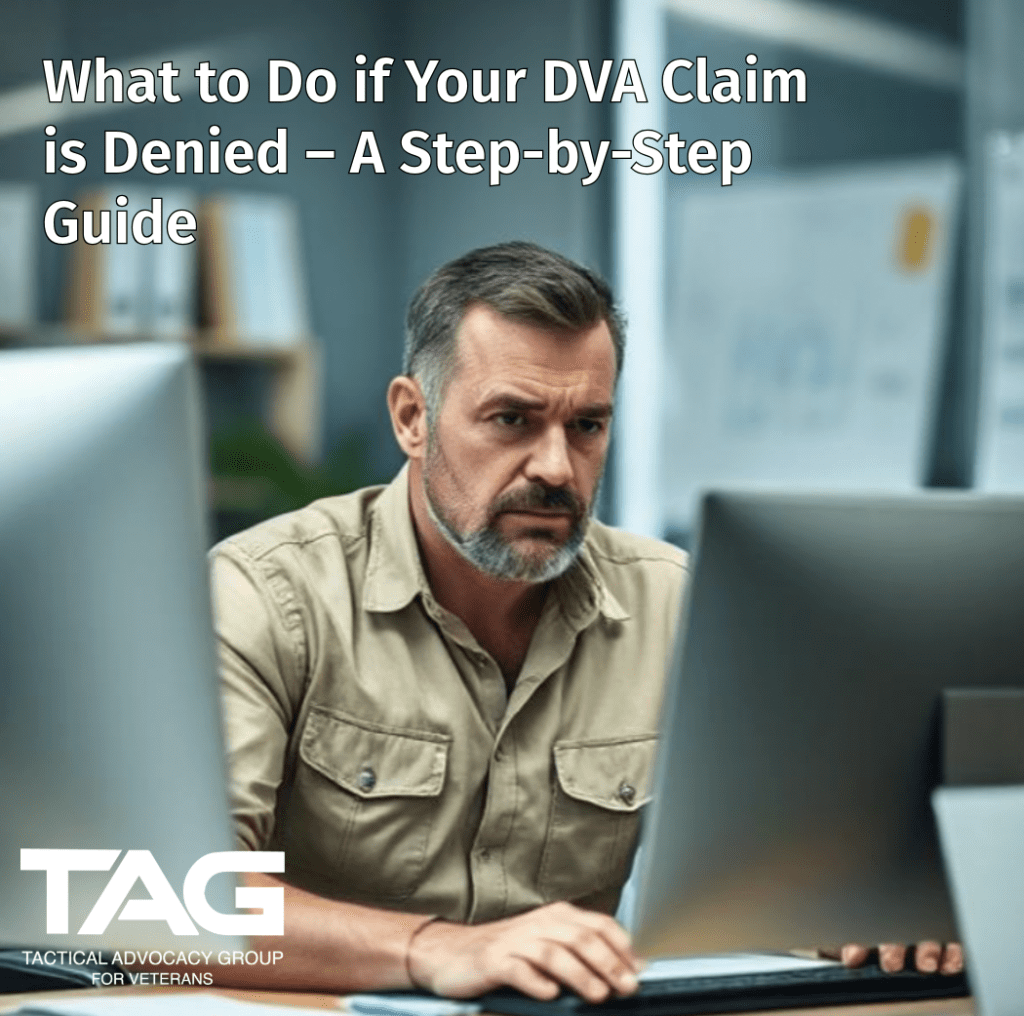What to Do if Your DVA Claim is Denied: A Step-by-Step Guide by DVA Claims Experts

We’re not going to lie – getting your DVA claim denied can feel like a punch to the guts. So much so, many veterans give up after receiving their first claim denial. In order to stop you from quitting prematurely, we’ve compiled a step-by-step guide on how to challenge the decision so you’re more likely to receive a successful outcome, second time around.
1. Don’t Give Up!
Sure, you’re going to be disappointed with the outcome, but remember this decision isn’t the be all and end all. In fact it’s been reported that 75% of claims have been overturned or changed when appealed. So, take some space (if you need it) to feel the blow, then give yourself a deadline to jump back on the horse to challenge the decision.
2. Review the DVA Claims Denial Decision
Understand the Reasons: Read the letter or notification carefully to understand why your claim was denied. This is crucial, as it will explain the DVA’s reasons and highlight any issues that may need to be addressed, such as missing evidence or medical documentation.
Check for Errors: Ensure that the DVA has considered all your relevant medical records and service history. Sometimes, a claim is denied because of missing or incorrect information.
3. Consider Seeking Help
- Veterans’ Advocacy Services: At TAG (Tactical Advocacy Group) we’re experienced advocates, who are veterans ourselves, and can provide you with thorough assistance with appealing your DVA claims. We’’ll help you navigate the entire process providing you with tailored support and strategic preparation for your appeal, as well as assistance with the Veterans Review Board
- DVA’s Client Services: If you’re unsure why your claim was denied, contact DVA’s Client Services for clarification. They may be able to explain the decision in greater detail or help you understand what additional information is needed.
4. Request a Reconsideration
- If you believe the decision for your DVA claim is incorrect or you have new evidence to support your claim, you can request a reconsideration of the decision.
- To request reconsideration, submit additional evidence or clarify any aspects of the DVA claim that were overlooked. This can include new medical reports, expert opinions, or additional service records.
5. Submit a Formal Appeal to the Veterans’ Review Board (VRB)
- If the reconsideration request is denied, you can lodge an appeal with the Veterans’ Review Board (VRB). The VRB is an independent body that reviews decisions made by DVA.
- Provide as much relevant supporting evidence as possible, such as medical records, expert opinions, and personal statements. TAG can assist veterans by reviewing and preparing appeals paperwork; however, from a contractual standpoint, this service is managed differently than standard claims.
- The VRB will either confirm the DVA decision or overturn it. You will receive a written decision.
6. Appeal to the Administrative Review Tribunal (ART)
- If you disagree with the decision of the VRB, you can appeal to the Administrative Review Tribunal (ART).
- The ART reviews the case in detail and can make its own decision on your claim.
- At this stage, you can present new evidence and can also attend a hearing to discuss your case in person.
7. Seek Legal Assistance (if necessary)
- If your DVA claim is still denied after going through the VRB and AAT, it may be beneficial to seek legal advice. Lawyers who specialise in veterans’ law can offer guidance, especially if the case is complex or involves legal arguments regarding your service and health conditions.
- Some veterans may be eligible for free or low-cost legal assistance through veteran-specific legal services.
8. Request a Judicial Review (if applicable)
- In rare cases, if all other appeal options are exhausted, you can apply for a judicial review in the Federal Court. This is typically done if you believe that there was a legal error in the decision-making process. It’s important to note that a judicial review will not look at the facts of your case but at whether the correct legal procedures were followed.
Ways in which TAG can help you with appealing DVA claims:
Sometimes the sheer amount of paperwork and bureaucracy you face can be overwhelming, which is why seeking help from TAG advocates is beneficial. They know the process inside out, so can help you with:
- Staying Organised: TAG advocates will help you keep track of all communication, decisions, and documentation related to your claim and appeals. They can help you keep a record of all correspondence, including dates, names of individuals you spoke with, and what was discussed.
- Time Limits: TAG advocates can help you be aware of the strict time limits for submitting appeals, because they know that missing a deadline can jeopardize your case.
- Compiling new Evidence: If your circumstances change or you obtain new evidence, TAG advocates can help you submit this as soon as possible to strengthen your case.
- Staying Persistent: The appeals process can be lengthy and may require persistence. TAG advocates can help you keep proactive and seek support from DVA representatives, or legal professionals, if needed.
You’re not alone in this. If you need guidance, or even just a chat, reach out—we’re here to help. 📩
Related Posts




